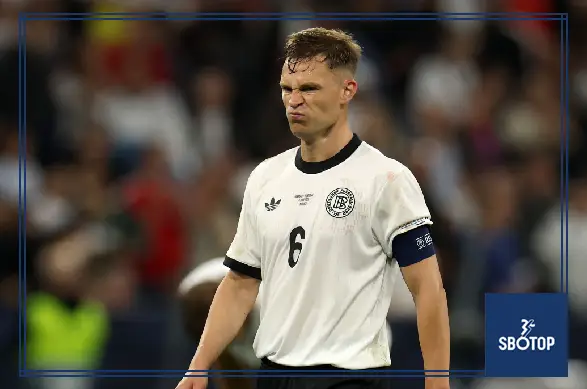In the world of football, every game is an intricate dance of strategy, skill, and emotion. For fans and players alike, the highs and lows of the sport can often feel like a rollercoaster ride. Few matches encapsulate this emotional spectrum better than Germany’s devastating loss to Portugal in the UEFA Nations League, a match that left fans heartbroken and players searching for answers. Among those who felt the sting most acutely was Joshua Kimmich, the midfield maestro often heralded as the beating heart of Germany’s national team.
Setting the Stage Germany’s Nations League Journey
Germany entered the UEFA Nations League with high expectations. As a team steeped in history and tradition, the Die Mannschaft has long been associated with a winning mentality and a legacy of dominance on the global stage. Under the stewardship of coach Hansi Flick, hopes were high that Germany could not only compete but also reclaim their place among Europe’s elite.
The group stage had its moments of brilliance. Germany showcased flashes of their renowned efficiency, with standout performances from Kimmich, Jamal Musiala, and Antonio Rüdiger. Yet, inconsistencies plagued their campaign. A defensive lapse here, a missed opportunity there – these small cracks in their armor foreshadowed what was to come.
The Bitter Defeat Portugal’s Tactical Brilliance
Germany’s loss to Portugal in the Nations League was a masterclass in tactical football – at least from the Portuguese perspective. Portugal, led by their talismanic captain Bruno Fernandes, executed a game plan that exploited Germany’s vulnerabilities. A well-organized defense stifled Germany’s attacking forays, while swift counter-attacks exposed their lack of cohesion at the back.
Portugal’s goals, scored by João Félix and Bernardo Silva, were a testament to their clinical finishing and intelligent movement. On the other side, Germany struggled to break through Portugal’s disciplined defense, with Kimmich finding himself isolated in midfield on multiple occasions. Despite his best efforts to orchestrate play and provide stability, the team appeared disjointed.
Kimmich’s Honest Appraisal
In the post-match press conference, Joshua Kimmich did not mince words. Known for his leadership on and off the pitch, Kimmich’s candid assessment of the loss resonated deeply with fans. “It’s bitter,” he admitted, his voice tinged with frustration and disappointment. “We had the talent, we had the chances, but at the end of the day, we didn’t deliver when it mattered most.”
Kimmich highlighted key areas where Germany fell short. “Our transitions were too slow,” he explained. “Against a team like Portugal, you can’t afford to give them time to organize defensively. We needed to be sharper, quicker, and more decisive.”
Leadership Under Scrutiny
As one of the team’s senior players, Kimmich has often been viewed as the natural successor to Germany’s legendary leaders like Philipp Lahm and Bastian Schweinsteiger. His ability to read the game, combined with his technical prowess, makes him a linchpin in Germany’s midfield. However, with great responsibility comes great scrutiny.
Critics were quick to point fingers at Kimmich, questioning whether he did enough to rally his teammates. Some pundits argued that his individual brilliance could not compensate for the lack of a cohesive team strategy. Kimmich, however, remained undeterred. “Leadership isn’t about shouting on the pitch,” he said. “It’s about setting an example and pushing everyone to give their best. I did everything I could, but football is a team sport – we win together and we lose together.”
The Tactical Breakdown What Went Wrong
To understand the defeat, one must delve into the tactical nuances of the game. Portugal’s coach, Roberto Martínez, deserves credit for his meticulous preparation. By deploying a high-pressing strategy, Portugal forced Germany into making mistakes in their defensive third. Germany’s reliance on building from the back became a double-edged sword, with turnovers leading to dangerous counter-attacks.
On the offensive end, Germany’s lack of a true number nine was glaring. While Kai Havertz and Leroy Sané showed flashes of brilliance, their inability to convert chances into goals proved costly. Kimmich’s role as a deep-lying playmaker meant he was often tasked with covering ground defensively, limiting his influence in the final third.
Reflections on Germany’s Football Identity
For many fans, the loss to Portugal was not just a defeat – it was a wake-up call. Germany, a team synonymous with precision and resilience, seemed to have lost its identity. Kimmich himself alluded to this in his post-match comments. “We need to rediscover who we are as a team,” he urged. “It’s not just about tactics or talent; it’s about the mentality and the hunger to win.”
This sentiment echoed the thoughts of football analysts who have long argued that Germany’s golden generation is at a crossroads. While players like Kimmich, Musiala, and Gnabry represent the future, the team must find a way to blend youthful exuberance with the wisdom of experience.
The Road Ahead Lessons Learned
In the aftermath of their Nations League exit, Germany faces a crucial period of introspection. With the European Championship on the horizon, there is little time to dwell on past failures. For Kimmich, the path forward is clear. “We have to learn from this,” he stated firmly. “Every loss is an opportunity to grow, to improve, and to come back stronger.”
Hansi Flick, too, will need to re-evaluate his tactical approach. While his emphasis on attacking football is commendable, the defensive frailties exposed against Portugal cannot be ignored. Finding the right balance between offense and defense will be key to Germany’s resurgence.
Fans’ Perspective The Emotional Fallout
For fans, the loss was a bitter pill to swallow. Social media platforms were flooded with reactions ranging from anger to heartbreak. Many pointed to the lack of urgency in Germany’s play, while others lamented the missed chances that could have turned the game around.
Amid the sea of criticism, there was also an outpouring of support for Kimmich. Fans praised his honesty and leadership, acknowledging that he has been one of the few constants in a team undergoing transition. “Kimmich represents everything good about German football,” one fan tweeted. “He’s the kind of player who wears his heart on his sleeve.”
Also Read:
- SBOTOP: Newcastle Target James Trafford as Eddie Howe Rethinks Nick Pope’s Role in Surprise Transfer Move
- SBOTOP Kevin De Bruyne’s Move to Napoli Stalled: Unveiling the Final ‘Small Obstacle’ Delaying Free Transfer
- SBOTOP: Tang Jie and Ee Wei Advance Past First Round Despite Lacking Full Court Chemistry










